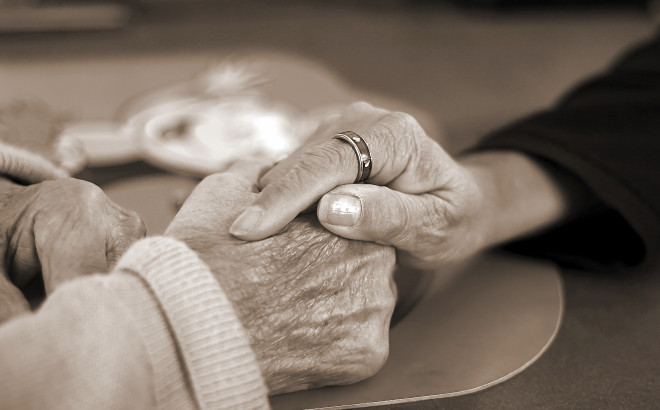Living with Alzheimer’s … some bonds just can’t be broken
Alzheimer’s disease is a brain disorder that progressively harms and ultimately destroys brain cells, leading to memory loss and changes in thinking and other brain functions.
People are at the greatest risk of developing Alzheimer’s disease if they are more than 85 years of age; they may have a reduced risk of developing memory loss-related diseases if they maintain a healthy lifestyle throughout their lives, according to the National Alzheimer’s Association.
Because people experience Alzheimer’s disease differently with varying symptoms, it is important that a doctor provide the diagnosis. Symptoms generally include the loss of problem-solving ability, impaired judgment, and loss of short-term memory.
Alzheimer’s disease occurs gradually. In fact, after a diagnosis is made, family members often say they believe they should have “seen it coming.”
As families learn to deal with a loved one’s Alzheimer’s diagnosis, they must become aware of the reality they face—the disease gets progressively worse and families should make plans to handle that decline.
There are, however, many resources available including a number of excellent books. The best suggestions take into consideration each’s family unique situation.
In fact, next week, Diakon will present the film “Glen Campbell…I’ll Be Me,” a documentary about how the popular singer and his family chronicled his Alzheimer’s disease diagnosis in a national “goodbye tour.” For information on this showing—scheduled for the SteelStacks in Bethlehem, Pennsylvania—see this link: www.diakon.org/campbell.
———————-
In this blog post, Aggie Llewellyn, Ed.D., MSN, writes about her father, who was diagnosed with Alzheimer’s disease. He is currently a resident of a Diakon senior living community.
My dad is a typical man of his generation. He was from an immigrant family of thirteen. He was raised on a farm in a small western Maryland community.
At the age of eighteen, he was drafted and served in the Army during WWII. During his deployment, he was in combat in the Battle of the Bulge, Normandy and took part in the liberation of the Dachau prison camp.
Upon his return to the United States, he married, completed his education in Chicago as an electrician and worked for more than 40 years, never missing a day of work. He was married for 48 years until my mother passed away; after her death, he stayed active and continued to volunteer in the community as a repairman, restoring old cars and helping anyone who needed assistance.
His life centered on family, faith and his volunteer work. In fact, he is the oldest firefighter in his local community.
I try to support my dad just by being with him as much as possible. He now needs me to manage his home, finances and medical care.
However, he really just needs to know I am there for him. My dad still loves to do things he enjoyed all his life, helping others and feeling valued. He loves to bowl and go on outings. He likes to laugh.
It is difficult when someone you love faces this diagnosis. If you find yourself in this position, here are a few tips:
1. Recognize the transition from daughter to caregiver is a journey, and you have to grieve the loss of the past relationship between father and daughter.
2. Embrace each day as a gift and know that despite the memory loss, there will always be a connection. Some bonds cannot be broken.
3. The safety for your loved one becomes so important, and you have to try to ensure a safe surrounding at all times.
4. It was difficult moving my dad from his home, first to my home and then to assisted living. I wanted to keep him at home, but came to realize that it was not the best place because of safety issues.
My goal now is to keep him as healthy and happy as possible—and spend as much time as I can with him.
Because we review comments, they do not appear immediately. Please do not submit each comment more than once. Please review our comment policy.


